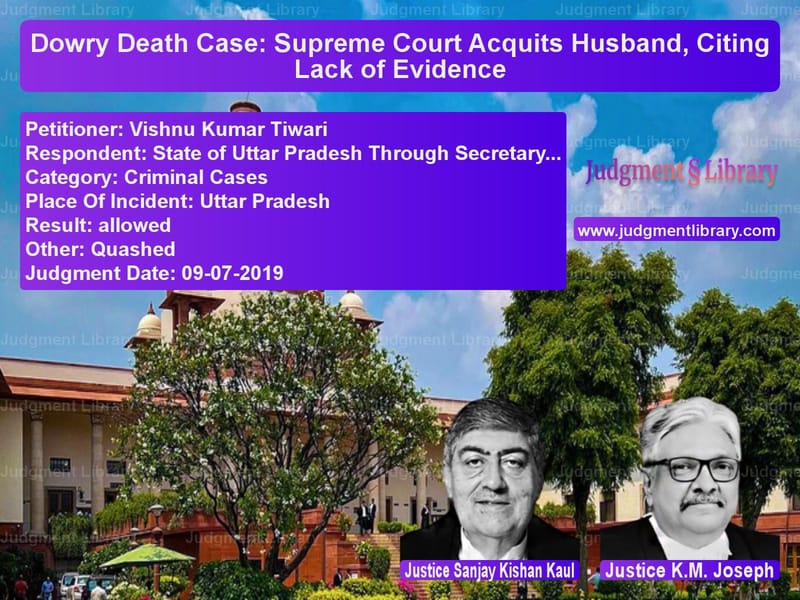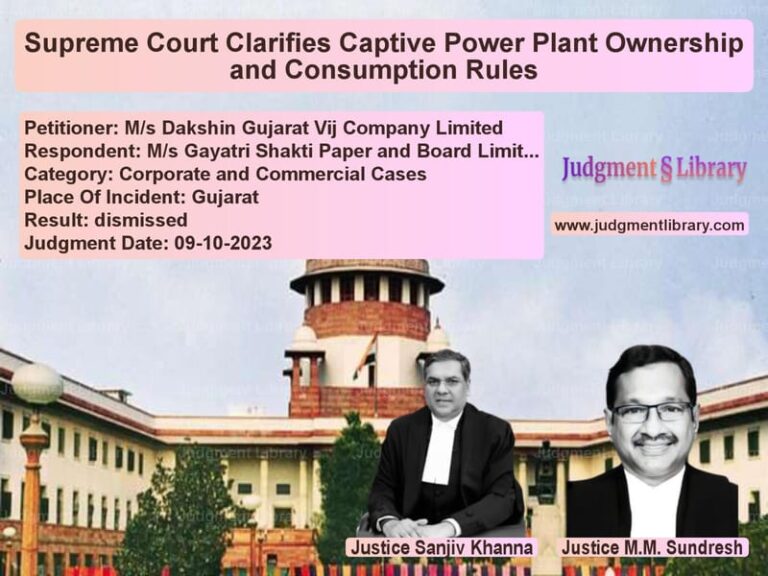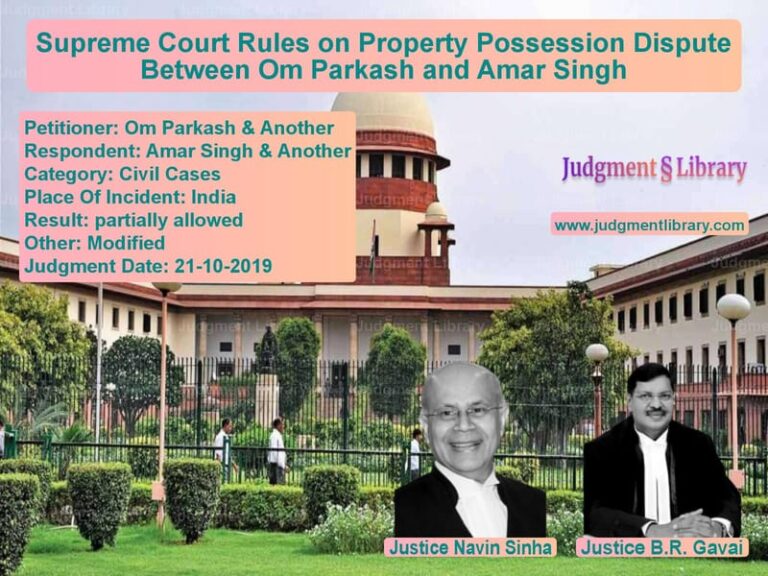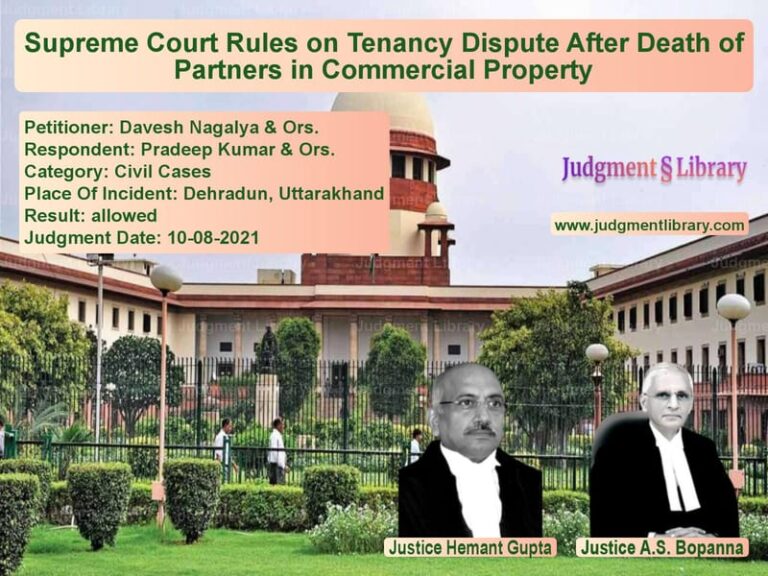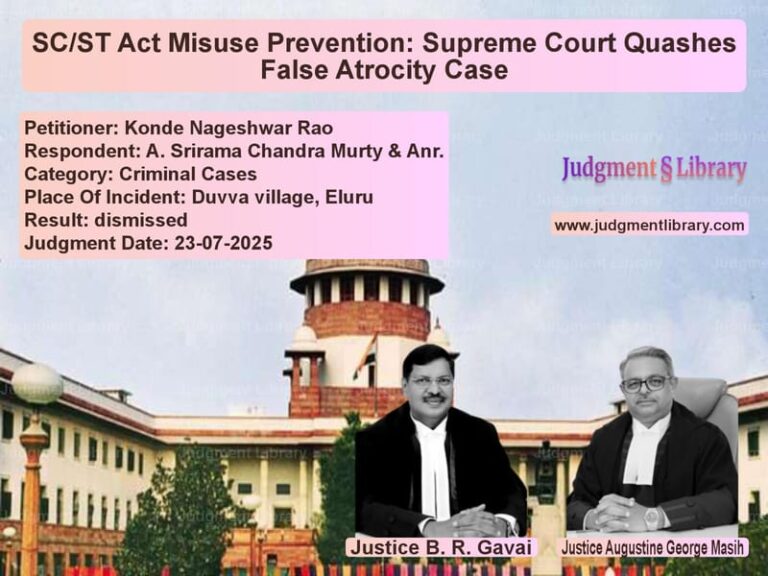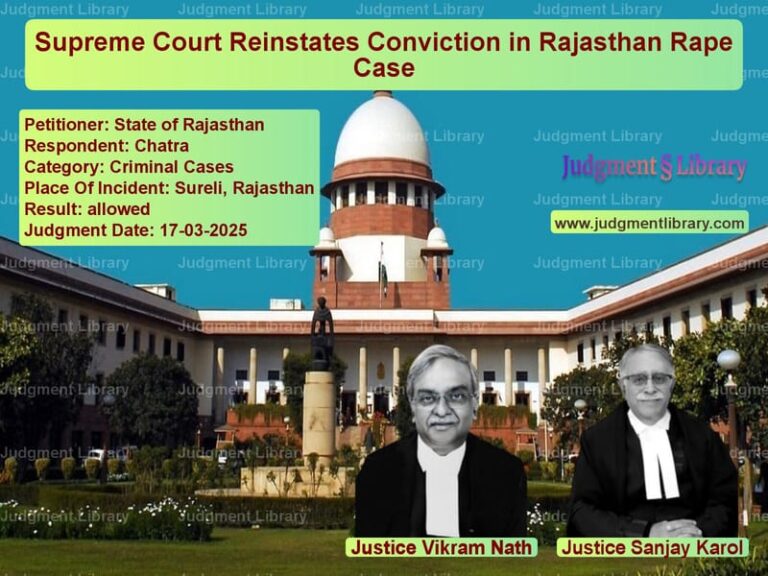Dowry Death Case: Supreme Court Acquits Husband, Citing Lack of Evidence
The Supreme Court of India, in its judgment dated July 9, 2019, delivered a significant ruling in the case of Vishnu Kumar Tiwari v. State of Uttar Pradesh. The case involved allegations of dowry harassment, cruelty, and the subsequent death of the appellant’s wife, leading to charges under Sections 201, 304B, and 498A of the Indian Penal Code (IPC) along with Sections 3 and 4 of the Dowry Prohibition Act, 1961. The Court overturned the High Court’s order, reaffirming that judicial decisions must be based on substantive evidence rather than presumptions.
Background of the Case
The appellant, Vishnu Kumar Tiwari, married the second respondent’s daughter on April 22, 2004. The second respondent (the complainant) alleged that the appellant’s family had demanded an Alto car and Rs. 2 lakhs for his admission to a B.Ed. course. Additionally, a demand for Rs. 4 lakhs was allegedly made at the time of the marriage. The complainant’s daughter had informed her mother about being harassed for dowry by her husband, in-laws, and extended family members.
On September 8, 2010, the complainant received a phone call informing him that his daughter was in critical condition. When he arrived at the appellant’s house, he was told that his daughter had been taken to a hospital. After a frantic search in multiple hospitals, he discovered that his daughter had died. The complainant accused the appellant and his family of killing his daughter due to dowry demands.
Following the complaint, an FIR was registered, and the police conducted an investigation. However, the police concluded that the woman had died due to illness and submitted a final report recommending no charges. The complainant then filed a protest petition, seeking further investigation.
Lower Court and High Court Proceedings
- The Chief Judicial Magistrate (CJM) reviewed the case and concluded that there was no prima facie evidence to support the charges under Sections 201, 304B, and 498A of IPC, as well as the Dowry Prohibition Act. The protest petition was dismissed.
- The complainant then filed a revision petition before the Additional Sessions Judge, who upheld the CJM’s decision and dismissed the case.
- Unhappy with the decision, the complainant filed a writ petition in the Allahabad High Court under Article 226 of the Constitution, seeking to quash the orders of the lower courts and direct a fresh investigation.
- The High Court set aside the orders of the lower courts and directed the CJM to reconsider the protest petition.
- The appellant, Vishnu Kumar Tiwari, then challenged the High Court’s decision in the Supreme Court.
Supreme Court’s Observations
The Supreme Court scrutinized the legal procedures followed in the case and the evidence presented. The key observations made by the Court were:
- The CJM had indeed considered the protest petition and had provided a reasoned order based on statements recorded under Section 161 of the Criminal Procedure Code (CrPC).
- There was no medical or forensic evidence suggesting that the deceased had been subjected to cruelty or unnatural death.
- The complainant’s statements about dowry harassment were inconsistent, and no independent witness corroborated these allegations.
- The death certificate issued by Priti Hospital stated that the deceased died of “cardio-pulmonary arrest due to septicemia and respiratory distress.”
- The complainant did not file any formal complaint of harassment while his daughter was alive.
The Supreme Court stated:
“The Magistrate is not bound to accept the final report filed by the police, but in the absence of compelling evidence to take cognizance, the decision to close the matter was justified. The High Court erred in interfering with a well-reasoned judicial order.”
Key Arguments of the Parties
Arguments by the Petitioner (Vishnu Kumar Tiwari):
- The appellant argued that his wife had died of natural causes due to septicemia and multiple organ failure.
- There was no direct evidence proving cruelty or dowry harassment.
- The police investigation, statements of doctors, and medical reports corroborated that the death was due to illness.
- The High Court exceeded its jurisdiction by ordering a re-examination of a settled case.
Arguments by the Respondent (Complainant):
- The complainant claimed that the deceased had faced consistent dowry harassment.
- The delay in informing the family about her death raised suspicions of foul play.
- The lower courts failed to consider affidavits provided by family members.
- The case should be reinvestigated to uncover any wrongdoing.
Final Verdict
The Supreme Court ruled in favor of the appellant, overturning the High Court’s decision. It held that:
- The findings of the CJM and the Additional Sessions Judge were based on substantial evidence and legal principles.
- The High Court erred in interfering with a legally sound order.
- No credible evidence supported the charges under Section 304B (dowry death) or Section 498A (cruelty).
- The appellant was acquitted, and the criminal proceedings against him were quashed.
- The complainant retained the right to file a fresh complaint if new evidence emerged.
Conclusion
This case highlights the necessity for courts to rely on clear evidence when adjudicating criminal matters, especially in sensitive dowry-related cases. The Supreme Court’s ruling reaffirms that judicial interference should be limited to cases where there is a clear miscarriage of justice. The verdict ensures that criminal law is not misused for personal vendettas and that allegations of dowry harassment must be substantiated with credible proof.
Petitioner Name: Vishnu Kumar Tiwari.Respondent Name: State of Uttar Pradesh Through Secretary Home.Judgment By: Justice Sanjay Kishan Kaul, Justice K.M. Joseph.Place Of Incident: Uttar Pradesh.Judgment Date: 09-07-2019.
Don’t miss out on the full details! Download the complete judgment in PDF format below and gain valuable insights instantly!
Download Judgment: Vishnu Kumar Tiwari vs State of Uttar Prade Supreme Court of India Judgment Dated 09-07-2019.pdf
Direct Downlaod Judgment: Direct downlaod this Judgment
See all petitions in Dowry Cases
See all petitions in Domestic Violence
See all petitions in Suicide Cases
See all petitions in Bail and Anticipatory Bail
See all petitions in Criminal Defamation
See all petitions in Judgment by Sanjay Kishan Kaul
See all petitions in Judgment by K.M. Joseph
See all petitions in allowed
See all petitions in Quashed
See all petitions in supreme court of India judgments July 2019
See all petitions in 2019 judgments
See all posts in Criminal Cases Category
See all allowed petitions in Criminal Cases Category
See all Dismissed petitions in Criminal Cases Category
See all partially allowed petitions in Criminal Cases Category

